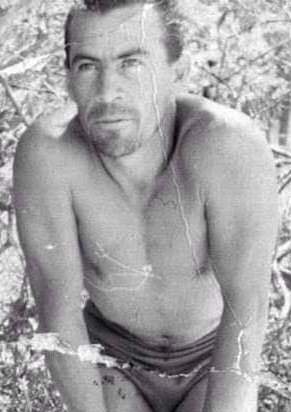
Ramón Esteban Gómez Valdés y Castillo was a Mexican actor and comedian. He is best remembered for his portrayal of Don Ramón. He is also recognized as one of Mexico's best comedians.

Germán Genaro Cipriano Teodoro Gómez Valdés y Castillo, known professionally as Tin-Tan, was a Mexican actor, singer and comedian who was born in Mexico City but was raised and began his career in Ciudad Juarez, Chihuahua. He often displayed the pachuco dress and employed pachuco slang in many of his movies, some with his brothers Manuel "El Loco" Valdés and Ramón Valdés. He made the language of the border Mexican, known in Spanish as fronterizos pachucos, famous in Mexico. A "caló" based in Spanglish, it was a mixture of Spanish and English in speech based on that of Mexicans on the Mexican side of the border, specifically Ciudad Juarez.

Wolf Ruvinskis, born Wolf Ruvinskis Manevics, was a Latvian-Mexican actor and professional wrestler. He was married to dancer Armida Herrera. Born to a Latvian mother and a Ukrainian father, of Jewish background, they relocated to Argentina in 1923. In spite of living in extreme poverty he excelled in sports and as a professional wrestler he toured South America, the United States and Mexico. This last country became his place of residence where he stayed in the ring well into the 1960s, wrestling El Santo, Black Shadow, El Médico Asesino and Lobo Negro. As a wrestler he was introduced to the Cinema of Mexico playing luchadores, in particular a masked character he created called Neutrón. He also belongs to the Golden Age of Mexican cinema.
Francisco Reiguera was a Spanish actor who is best known for playing the title role in Orson Welles’ unfinished film version of Don Quixote. He also appeared in the films Simon of the Desert (1965), Major Dundee (1965) and Guns for San Sebastian (1968).
Francisco Amado Córdova Ramírez was a Mexican character actor who has appeared in numerous films of United States and Mexico.
Las aventuras de Pito Pérez is a 1957 Mexican film directed by Juan Bustillo Oro and produced by Fernando de Fuentes, and starring Germán Valdés. It is based on the 1938 novel La vida inútil de Pito Pérez by José Rubén Romero.

Antonio Gómez Valdés de Castillo, better known as Ratón Valdés, was a Mexican actor and comedian, brother of the actors Germán, Manuel and Ramón. Antonio participated in the programs La Cosa and Puro Loco, tracing the origin of his career during the Golden Age of Mexican cinema, where he participated in several films with his brothers.

Gloria Evangelina Elizondo López-Llera was a Mexican actress and singer from the Golden Age of Mexican cinema. She starred in movies, television and theater. She was an accomplished artist having studied at the National School of Painting and had a degree in theology. She wrote two books and recorded numerous albums. In 2014, she received a Premios Arlequín for her contributions to Mexican culture.

Music, Poetry and Madness is a 1948 Mexican comedy film directed by Humberto Gómez Landero, who also co-wrote the screenplay. It stars Germán Valdés, Marcelo Chávez and Meche Barba.
The Unknown Mariachi is a 1953 Mexican comedy film directed by Gilberto Martínez Solares and starring Germán Valdés, Rosa de Castilla and Gloria Mange.

Tender Pumpkins or Tender Little Pumpkins is a 1949 Mexican comedy film directed by Gilberto Martínez Solares and starring Germán Valdés, Rosita Quintana and Nelly Montiel. This film marked the acting debut of Ramón Valdés, known mainly for portraying Don Ramón in the 1970s sitcom El Chavo del Ocho.

The Disobedient Son is a 1945 Mexican comedy film directed by Humberto Gómez Landero and starring Germán Valdés, Marcelo Chávez and Delia Magaña. It was shot at the Azteca Studios in Mexico City. The film's sets were designed by the art director Vicente Petit.
Rough But Respectable or I Am a Chic Charro is a 1949 Mexican comedy film directed by Gilberto Martínez Solares and starring Germán Valdés, Marcelo Chávez and Rosita Quintana.

Music Inside is a 1947 Mexican musical comedy film directed by Humberto Gómez Landero and starring Tin-Tan, Marcelo Chávez and Marga López.
Look What Happened to Samson is a 1955 Mexican comedy film directed by Gilberto Martínez Solares and starring Germán Valdés, Ana Bertha Lepe and Yolanda Varela.

Oh Darling! Look What You've Done To Me! is a 1951 Mexican romantic comedy film directed by Gilberto Martínez Solares and starring Germán Valdés, Rebeca Iturbide and Marcelo Chávez. It was shot at the Tepeyac Studios in Mexico City. The film's sets were designed by the art director José Rodríguez Granada.

The Island of Women is a 1953 Mexican comedy film directed by Rafael Baledón and starring Germán Valdés, Lilia del Valle and The Julian Sisters. A man is stranded on a desert island which is ruled by women.
Alfredo Vergara Morales, best known by the stage name Eduardo Alcaraz, was a Chilean-Mexican actor. Born in Santiago, he was based in Mexico since 1951. He appeared in films such as Escuela de rateros (1958) alongside Pedro Infante. He also worked as voice actor in many movies and cartoons.
Florencio Castelló was a Spanish actor, known for participating in the Golden Age of Mexican cinema, acting alongside personalities of Mexican cinema such as Pedro Infante and Cantinflas. He usually played roles of a Spaniard with an Andalusian accent.
Jorge Stahl Jr. (1921–2003) was a Mexican cinematographer. Active for several decades, he began his career in the Golden Age of Mexican Cinema.










